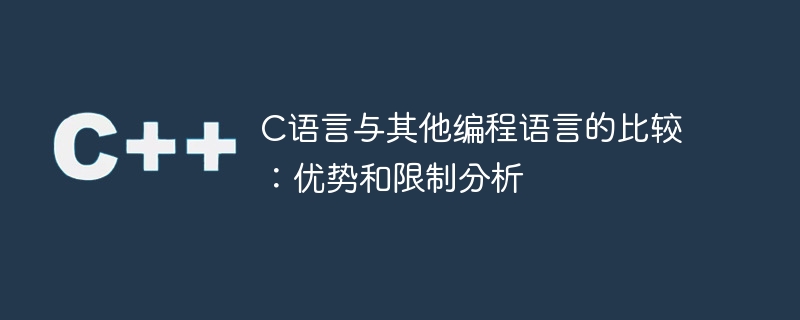Home >Backend Development >C++ >C language compared to other programming languages: analysis of advantages and limitations
C language compared to other programming languages: analysis of advantages and limitations
- WBOYWBOYWBOYWBOYWBOYWBOYWBOYWBOYWBOYWBOYWBOYWBOYWBOriginal
- 2024-02-23 13:18:041276browse

Comparison of C Language with Other Programming Languages: Advantages and Limitations Analysis
Overview:
In the field of computer science, programming languages are widely used to write software and develop applications. Different programming languages have different features and advantages. Among these programming languages, C language is one of the most widely used and well-known languages. This article will explore the comparison between C language and other major programming languages, focusing on the advantages and limitations of C language.
Advantages:
- Simple and efficient: C language is a relatively simple language. It uses concise syntax and has a relatively small amount of code. Compared with other programming languages, the execution speed of C language is very fast because it is closer to the hardware operation level.
- Cross-platform: C language is a highly portable language. C language code can run on different operating systems, including Windows, Linux, macOS, etc. This feature makes C language the preferred language for cross-platform development.
- Powerful low-level programming capabilities: C language provides powerful and flexible low-level programming capabilities, which can directly access memory and hardware resources. This makes the C language very suitable for developing low-level applications such as embedded systems and drivers.
- Rich library support: C language has rich library support, and various functions can be quickly realized by calling library functions. The standard library provides a large number of functions, covering input and output, string processing, mathematical operations, etc., providing developers with powerful and convenient tools.
Limitations:
- Lack of object-oriented features: Compared to many modern programming languages, C lacks object-oriented programming features. This means that when developing complex applications using C language, more code and more complex designs may be required.
- Difficulty in memory management: C language does not provide an automatic garbage collection mechanism, but requires developers to manually manage memory. This means that developers need to be particularly careful when allocating and freeing memory, otherwise it may lead to problems such as memory leaks and dangling pointers.
- Prone to security vulnerabilities: Due to the flexible underlying programming capabilities of the C language, developers are more susceptible to potential security vulnerabilities. For example, issues such as buffer overflows and out-of-bounds access require developers to undergo rigorous code review and testing to reduce risks.
- High syntax complexity: Although the syntax of C language is relatively simple, more code and skills may be required when dealing with some complex problems. Compared with other modern programming languages, C language has higher grammatical complexity when expressing and solving complex problems.
Summary:
Although C language has its advantages and limitations, it is still a very important and useful programming language. It is widely used in areas such as system-level programming, embedded development and drivers. For developers who want to deeply understand the underlying workings of computers, mastering the C language is essential.
However, with the development of computer science, many new programming languages such as Java, Python, and C have emerged, which are more powerful and convenient in object-oriented programming, dynamic typing, and automatic memory management. Therefore, when choosing a programming language, developers need to weigh various factors and choose the most suitable language based on the needs and goals of the project. In any case, while learning and understanding the C language, you should also pay attention to the development and trends of other programming languages to adapt to the increasingly changing programming environment.
The above is the detailed content of C language compared to other programming languages: analysis of advantages and limitations. For more information, please follow other related articles on the PHP Chinese website!

